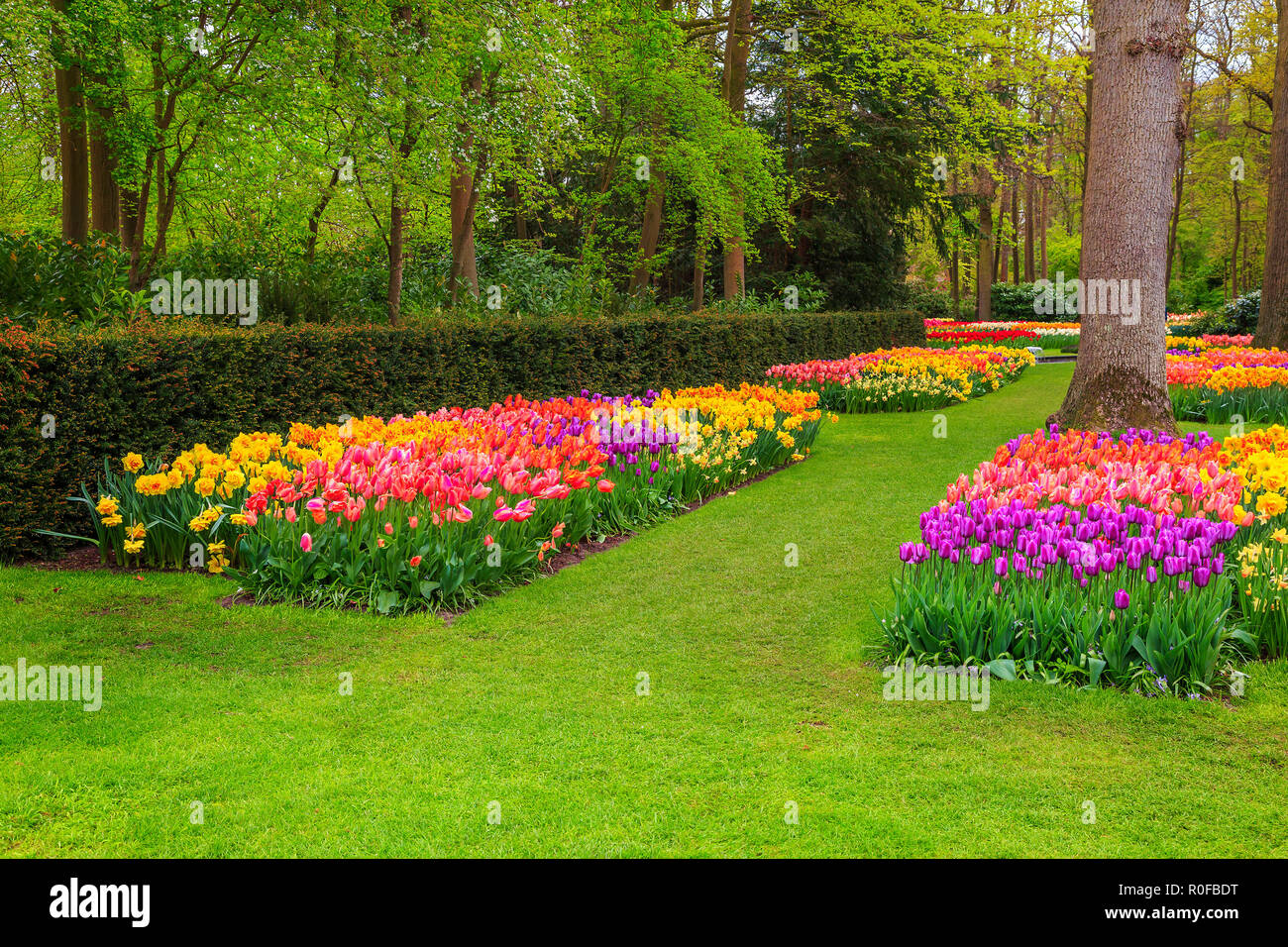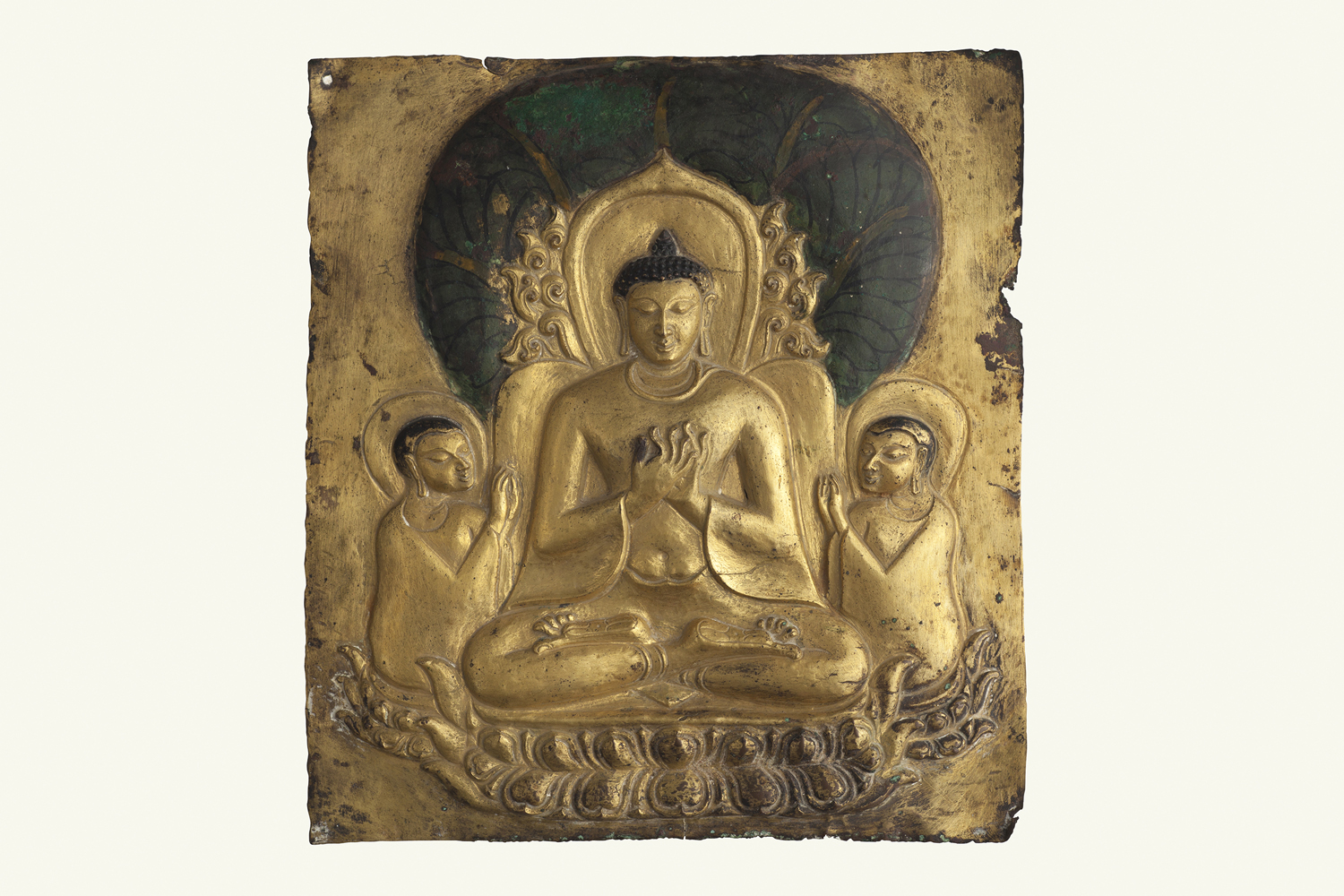translated from the Pali by
I.B. Horner
© 1998
Thus have I heard: At one time the Lord was staying near Rajagaha in the Bamboo Grove at the squirrels' feeding place. Now at that time the novice Aciravata was staying in the Forest Hut.[1] Then prince Jayasena,[2] who was always pacing up and down, always roaming about on foot, approached the novice Aciravata; having approached he exchanged greetings with the novice Aciravata; having exchanged greetings of friendliness and courtesy, he sat down at a respectful distance. While he was sitting down at a respectful distance, Prince Jayasena spoke thus to the novice Aciravata:
"I have heard, good Aggivessana, that if a monk is abiding here diligent, ardent, self-resolute, he may attain one-pointedness of mind."
"That is so, prince; that is so, prince. A monk abiding here diligent, ardent, self-resolute, may attain one-pointedness of mind."
"It were good if the reverend Aggivessana were to teach me dhamma as he has heard it, as he has mastered it."
"I, prince, am not able to teach you dhamma as I have heard it, as I have mastered it. Now, if I were to teach you dhamma as I have heard it, as I have mastered it, and if you could not understand the meaning of what I said, that would be weariness to me, that would be a vexation to me."
"Let the reverend Aggivessana teach me dhamma as he has heard it, as he has mastered it. Perhaps I could understand the meaning of what the good Aggivessana says."
"If I were to teach you dhamma, prince, as I have heard it, as I have mastered it, and if you were to understand the meaning of what I say, that would be good; if you should not understand the meaning of what I say, you must remain as you are: you must not question me further on the matter."
"Let the reverend Aggivessana teach me dhamma as he has heard it, as he has mastered it. If I understand the meaning of what the good Aggivessana says, that will be good; if I do not understand the meaning of what the good Aggivessana says, I will remain as I am; I will not question the reverend Aggivessana further on this matter."
Then the novice Aciravata taught dhamma to Prince Jayasena as he had heard it, as he had mastered it. When this had been said, Prince Jayasena spoke thus to the novice Aciravata:
"This is impossible, good Aggivessana, it cannot come to pass that a monk abiding diligent, ardent, self-resolute, should attain one-pointedness of mind." Then Prince Jayasena, having declared to the novice Aciravata that this was impossible and could not come to pass, rising from his seat, departed.
And soon after Prince Jayasena had departed, the novice Aciravata approached the Lord; having approached and greeted the Lord, he sat down at a respectful distance. As he was sitting down at a respectful distance, the novice Aciravata told the Lord the whole of the conversation he had with Prince Jayasena as far as it had gone. When this had been said, the Lord spoke thus to the novice Aciravata:
"What is the good of that, Aggivessana? That Prince Jayasena, living as he does in the midst of sense-pleasures, enjoying sense-pleasures, being consumed by thoughts of sense-pleasures, burning with the fever of sense-pleasures, eager in the search for sense-pleasures, should know or see or attain or realize that which can be known by renunciation, seen by renunciation, attained by renunciation, realized by renunciation — such a situation does not exist. It is as if, Aggivessana, among elephants or horses or oxen to be tamed, two elephants, two horses or two oxen are well tamed, well trained, and two are not tamed, not trained. What do you think about this, Aggivessana? Would these two elephants or horses or oxen that were to be tamed and that were well tamed, well trained — would these on being tamed reach tamed capacity, would they, being tamed, attain a tamed stage?"
"Yes, revered sir."
"But those two elephants or horses or oxen that were to be tamed but that were neither tamed nor trained — would these, not being tamed, attain a tamed stage as do the two elephants or horses or oxen to be tamed that were well tamed, well trained?"
"No, revered sir."
"Even so, Aggivessana, that Prince Jayasena, living as he does in the midst of sense-pleasures... should know or see or attain or realize that which can be known and realized by renunciation — such a situation does not exist. It is as if, Aggivessana, there were a great mountain slope near a village or a market-town which two friends, coming hand in hand from that village or market-town might approach; having approached the mountain slope one friend might remain at the foot while the other might climb to the top. Then the friend standing at the foot of the mountain slope might speak thus to the one standing on the top: 'My dear, what do you see as you stand on the top of the mountain slope?' He might reply: 'As I stand on the top of the mountain slope I, my dear, see delightful parks, delightful woods, delightful stretches of level ground delightful ponds.' But the other might speak thus: 'This is impossible, it cannot come to pass, my dear, that, as you stand on the top of the mountain slope, you should see... delightful ponds.' Then the friend who had been standing on top of the mountain slope having come down to the foot and taken his friend by the arm, making him climb to the top of the mountain slope and giving him a moment in which to regain his breath, might speak to him thus: 'Now, my dear, what is it that you see as you stand on the top of the mountain slope?' He might speak thus: 'I, my dear, as I stand on the top of the mountain slope, see delightful parks... delightful ponds.' He might speak thus: 'Just now, my dear, we understood you to say: This is impossible, it cannot come to pass that, as you stand on the top of the mountain slope, you should see delightful... ponds. But now we understand you to say: 'I, my dear, as I stand on the top of the mountain slope, see delightful parks... delightful ponds.' He might speak thus: 'That was because I, my dear, hemmed in by this great mountain slope, could not see what was to be seen.'
"Even so but to a still greater degree, Aggivessana, is Prince Jayasena hemmed in, blocked, obstructed, enveloped by this mass of ignorance. Indeed, that Prince Jayasena, living as he does in the midst of sense-pleasures, enjoying sense-pleasures, being consumed by thoughts of sense-pleasures, eager in the search for sense-pleasures, should know or see or attain or realize that which can be known... seen... attained... realized by renunciation — such a situation does not exist. Had these two similes occurred to you, Aggivessana, for Prince Jayasena, Prince Jayasena naturally would have acted in the manner of one having trust in you."
"But how could these two similes for Prince Jayasena have occurred to me, revered sir, seeing that they are spontaneous, that is to say to the Lord, and have never been heard before?"
"As, Aggivessana, a noble anointed king addresses an elephant hunter saying; 'You, good elephant hunter, mount the king's elephant and go into an elephant forest. When you see a forest elephant, tie him to the neck of the king's elephant.' And, Aggivessana, the elephant hunter having answered: 'Yes, sire,' in assent to the noble anointed king, mounts the king's elephant and goes into an elephant forest. Seeing a forest elephant, he ties him to the neck of the king's elephant. So the king's elephant brings him out into the open. But, Aggivessana, the forest elephant has this longing, that is to say for the elephant forest. But in regard to him the elephant hunter tells the noble anointed king that the forest elephant has got out into the open. The noble anointed king then addresses an elephant tamer, saying: 'Come you, good elephant tamer, tame the forest elephant by subduing his forest ways, by subduing his forest memories, and aspirations and by subduing his distress, his fretting and fever for the forest, by making him pleased with the villages and by accustoming him to human ways.'
"And, Aggivessana, the elephant tamer, having answered 'Yes, sire,' in assent to the noble anointed king, driving a great post into the ground ties the forest elephant to it by his neck so as to subdue his forest ways... and accustom him to human ways. Then the elephant tamer addresses him with such words as are gentle, pleasing to the ear, affectionate, going to the heart, urbane, pleasant to the manyfolk, liked by the manyfolk. And, Aggivessana, the forest elephant, on being addressed with words that are gentle... liked by the manyfolk, listens, lends ear and bends his mind to learning. Next the elephant tamer supplies him with grass-fodder and water. When, Aggivessana, the forest elephant has accepted the grass-fodder and water from the elephant tamer, it occurs to the elephant tamer: 'The king's elephant will now live.' Then the elephant tamer makes him do a further task, saying: 'Take up, put down.' When, Aggivessana the king's elephant is obedient to the elephant tamer and acts on his instructions to take up and put down, then the elephant tamer makes him do a further task, saying: 'Get up, sit down.' When, Aggivessana, the king's elephant is obedient to the elephant tamer and acts on his instructions to get up and sit down, then the elephant tamer makes him do a further task; known as 'standing your ground': he ties a shield to the great beast's trunk; a man holding a lance is sitting on his neck, and men holding lances are standing surrounding him on all sides; and the elephant tamer, holding a lance with a long shaft, is standing in front. While he is doing the task of 'standing your ground' he does not move a fore-leg nor does he move a hind-leg, nor does he move the forepart of his body, nor does he move the hindpart of his body, nor does he move his head, nor does he move an ear, nor does he move a tusk, nor does he move his tail, nor does he move his trunk. A king's elephant is one who endures blows of sword, axe, arrow, hatchet, and the resounding din of drum and kettle-drum, conch and tam-tam, he is [like] purified gold purged of all its dross and impurities, fit for a king, a royal possession and reckoned as a kingly attribute.
Acquisition of faith
"Even so, Aggivessana, does a Tathagata arise here in the world, a perfected one, fully Self-Awakened One, endowed with right knowledge and conduct, well-farer, knower of the worlds, the matchless charioteer of men to be tamed, the Awakened One, the Lord. He makes known this world with the devas, with Mara, with Brahma, the creation with its recluses and brahmans, its devas and men, having realized them by his own super-knowledge. He teaches dhamma which is lovely at the beginning, lovely in the middle, lovely at the ending, with the spirit and the letters; he proclaims the Brahma-faring,[3] wholly fulfilled, quite purified. A householder or a householder's son or one born in another family hears that dhamma. Having heard that dhamma he gains faith in the Tathagata. Endowed with this faith that he has acquired, he reflects in this way: 'The household life is confined and dusty, going forth is in the open; it is not easy for one who lives in a house to fare the Brahma-faring wholly fulfilled, wholly pure, polished like a conch-shell. Suppose now that I, having cut off hair and beard, having put on saffron robes, should go forth from home into homelessness?' After a time, getting rid of his wealth, be it small or great, getting rid of his circle of relations, be it small or great, having cut off his hair and beard, having put on saffron robes, he goes forth from home into homelessness. To this extent, Aggivessana, the ariyan disciple gets out into the open.
Morality
"But, Aggivessana, devas and mankind have this longing, that is to say, for the five strands of sense-pleasures. The Tathagata disciplines him further, saying: 'Come you, monk, be moral, live controlled by the control of the Obligations, possessed of [right] behavior and posture, seeing danger in the slightest faults; undertaking them, train yourself in the rules of training.'
Sense-Control
"And when, Aggivessana, the ariyan disciple is moral, lives controlled by the control..., undertaking them, trains himself in the rules of training, then the Tathagata disciplines him further, saying: 'Come you, monk, be guarded as to the doors of the sense-organs. Having seen a having seen a material shape with the eye, do not be entranced with the general appearance, do not be entranced with the detail; for if one dwells with the organ of sight uncontrolled, covetousness and dejection, evil, unskillful states of mind, may flow in. So fare along controlling it, guard the organ of sight, achieve control over the organ of sight. Having heard a sound with the ear... Having smelt a smell with the nose... Having savored a taste with the tongue... Having felt a touch with the body... Having cognized a mental state with the mind, be not entranced by the general appearance, be not entranced by the detail. For if you dwell with the organ of mind uncontrolled, covetousness and dejection, evil unskillful states of mind, might flow in. So fare along with its control, guard the organ of mind, achieve control over the organ of the mind.'
Moderation in eating
"And when, Aggivessana, the ariyan disciple is guarded as to the doors of the sense-organs, then the Tathagata disciplines him further, saying: 'Come you, monk, be moderate in eating; you should take food reflecting carefully, not for fun or indulgence or personal charm or beautification, but taking just enough for maintaining this body and keeping it going, for keeping it unharmed, for furthering the Brahma-faring, with the thought: Thus will I crush out an old feeling, and I will not allow a new feeling to arise, and then there will be for me subsistence and blamelessness and abiding in comfort.'
Vigilance
"When, Aggivessana, the ariyan disciple is moderate in eating, the Tathagata disciplines him further, saying: 'Come you, monk, abide intent on vigilance; during the day while pacing up and down, while sitting down, cleanse the mind of obstructive mental states; during the middle watch of the night, lie down on the right side in the lion posture, foot resting on foot, mindful, clearly conscious, reflecting on the thought of getting up again; during the last watch of the night, when you have arisen, while pacing up and down, while sitting down, cleanse the mind of obstructive mental states.'
Mindfulness and clear consciousness
"And when, Aggivessana, the ariyan disciple is intent on vigilance, then the Tathagata disciplines him further, saying: 'Come you, monk, be possessed of mindfulness and clear consciousness, acting with clear consciousness whether you are approaching or departing, acting with clear consciousness whether you are looking ahead or looking round, acting with clear consciousness whether you are bending in or stretching out [the arms], acting with clear consciousness whether you are carrying the outer cloak, the bowl or robe, acting with clear consciousness whether you are eating, drinking, munching, savoring, acting with clear consciousness whether you are obeying the calls of nature, acting with clear consciousness whether you are walking, standing, sitting, asleep, awake, talking or being silent.'
Overcoming of the five hindrances
"And when, Aggivessana, the ariyan disciple is possessed of mindfulness and clear consciousness, then the Tathagata disciplines him further, saying: 'Come you, monk, choose a remote lodging in a forest, at the root of a tree, on a mountain slope, in a wilderness, in a hill-cave, a cemetery, a forest haunt, in the open or on a heap of straw.' He chooses a remote lodging in the forest... or on a heap of straw. Returning from alms-gathering, after the meal, he sits down cross-legged, holding the back erect, having made mindfulness rise up in front of him, he, by getting rid of coveting for the world, dwells with a mind devoid of coveting, he purifies the mind of coveting. By getting rid of the taint of ill-will, he dwells benevolent in mind, compassionate for the welfare of all creatures and beings, he purifies the mind of the taint of ill-will. By getting rid of sloth and torpor, he dwells devoid of sloth and torpor; perceiving the light, mindful, clearly conscious, he purifies the mind of sloth and torpor. By getting rid of restlessness and worry, he dwells calmly the mind subjectively tranquilized, he purifies the mind of restlessness and worry. By getting rid of doubt, he dwells doubt-crossed, unperplexed as to the states that are skillful, he purifies the mind of doubt.
The four applications of mindfulness
"He, by getting rid of these five hindrances which are defilements of the mind and weakening to intuitive wisdom, dwells contemplating the body in the body, ardent, clearly conscious [of it], mindful [of it] so as to control the covetousness and dejection in the world. He fares along contemplating the feelings... the mind... the mental states in mental states, ardent, clearly conscious [of them], mindful [of them] so as to control the covetousness and dejection in the world.
"As, Aggivessana, an elephant tamer, driving a great post into the ground, ties a forest elephant to it by his neck so as to subdue his forest ways, so as to subdue his forest aspirations, and so as to subdue his distress, his fretting and fever for the forest, so as to make him pleased with villages and accustom him to human ways — even so, Aggivessana, these four applications of mindfulness are ties of the mind so as to subdue the ways of householders and to subdue the aspirations of householders and to subdue the distress, the fretting and fever of householders; they are for leading to the right path, for realizing nibbana.
"The Tathagata then disciplines him further, saying: 'Come you, monk, fare along contemplating the body in the body, but do not apply yourself to a train of thought connected with the body; fare along contemplating the feelings in the feelings... the mind in the mind... mental states in mental states, but do not apply yourself to a train of thought connected with mental states.'
Jhana
"He by allaying initial thought and discursive thought, with the mind subjectively tranquilized and fixed on one point, enters on and abides in the second meditation[4] which is devoid of initial and discursive thought, is born of concentration and is rapturous and joyful. By the fading out of rapture, he dwells with equanimity, attentive and clearly conscious, and experiences in his person that joy of which the ariyans say: 'Joyful lives he who has equanimity and is mindful,' and he enters and abides in the third meditation. By getting rid of joy, by getting rid of anguish, by the going down of his former pleasures and sorrows, he enters and abides in the fourth meditation which has neither anguish nor joy, and which is entirely purified by equanimity and mindfulness.
(The three knowledges, te-vijja)
(1. Recollection of former habitations)
"Then with the mind composed thus, quite purified, quite clarified, without blemish, without defilement, grown pliant and workable, fixed, immovable, he directs his mind to the knowledge and recollection of former habitation: he remembers a variety of former habitations, thus: one birth, two births, three... four... five... ten... twenty... thirty... forty... fifty... a hundred... a thousand... a hundred thousand births, and many an eon of integration and many an eon of disintegration and many an eon of integration-disintegration: 'Such a one was I by name, having such a clan, such and such a color, so was I nourished, such and such pleasant and painful experiences were mine, so did the span of life end. Passing from this, I came to be in another state where such a one was I by name, having such and such a clan, such and such a color, so was I nourished, such and such pleasant and painful experiences were mine, so did the span of life end. Passing from this, I arose here.' Thus he remembers divers former habitations in all their modes and details.
(2. The Divine Eye)
"Then with the mind composed, quite purified, quite clarified, without blemish, without defilement, grown pliant and workable, fixed, immovable, he directs his mind to the knowledge of the passing hence and the arising of beings. With the purified deva-vision surpassing that of men, he sees beings as they pass hence or come to be; he comprehends that beings are mean, excellent, comely, ugly, well-going, ill-going, according to the consequence of their deeds, the he thinks: Indeed these worthy beings who were possessed of wrong conduct in body, who were possessed of wrong conduct in speech, who were possessed of wrong conduct of thought, scoffers at the ariyans, holding a wrong view, incurring deeds consequent on a wrong view — these, at the breaking up of the body after dying, have arisen in a sorrowful state, a bad bourn, the abyss, Niraya hell. But these worthy beings who were possessed of good conduct in body, who were possessed of good conduct in speech, who were possessed of good conduct in thought, who did not scoff at the ariyans, holding a right view, incurring deeds consequent on a right view — these, at the breaking up of the body, after dying, have arisen in a good bourn, a heaven world.
(3. Destruction of Cankers: Sainthood)
"Then with the mind composed... immovable, he directs his mind to the knowledge of the destruction of the cankers.[5] He understands as it really is: This is anguish,[6] this is the arising of anguish, this is the stopping of anguish, this is the course leading to the stopping of anguish. He understands as it really is: These are the cankers, this is the arising of the cankers, this is the stopping of the cankers, this is the course leading to the stopping of the cankers. Knowing thus, seeing thus, his mind is freed from the canker of sense pleasures, is freed from the canker of becoming, freed from the canker of ignorance. In freedom the knowledge came to be: I am freed; and he comprehends: Destroyed is birth, brought to a close is the Brahma-faring, done is what was to be done, there is no more of being such or such.
"That monk is able to endure heat, cold, hunger, thirst, the touch of mosquitoes, gadflies, wind, sun and creeping things, abusive language and unwelcome modes of speech: he has grown to bear bodily feelings which as they arise are painful, acute, sharp, severe, wretched, miserable, deadly. Purged of all the dross and impurities of attachment, aversion and confusion,[7] he is worthy of oblations, offerings, respect and homage, an unsurpassed field of merit in the world.
"If, Aggivessana, a king's elephant dies in old age, untamed, untrained, the king's old elephant that has died is reckoned as one that has died untamed: And so, Aggivessana, of a king's elephant that is middle-aged. And too, Aggivessana, if a king's elephant dies young, untamed, untrained, the king's young elephant that has died is reckoned as one that has died untamed. Even so, Aggivessana, if a monk who is an elder dies with the cankers not destroyed, the monk who is an elder that has died is reckoned as one that has died untamed. And so of a monk of middle standing. And too, Aggivessana, if a newly ordained monk dies with the cankers not destroyed, the newly ordained monk that has died is reckoned as one that has died untamed. If, Aggivessana, a king's elephant dies in old age, well tamed, well trained, the king's old elephant that has died is reckoned as one that has died tamed. And so, Aggivessana of a king's elephant that is middle-aged. And too, Aggivessana, if a king's elephant dies young, well tamed, well trained, the king's young elephant that has died is reckoned as one that has died tamed. Even so, Aggivessana, if a monk who is an elder dies with the cankers destroyed, the monk who is an elder that has died is reckoned as one that has died tamed. And so, Aggivessana, of a monk of middle standing. And too, Aggivessana, if a newly ordained monk dies with cankers destroyed, the newly ordained monk that has died is reckoned as one that has died tamed."
Thus spoke the Lord. Delighted, the novice Aciravata rejoiced in what the Lord had said.
Notes
1.A hut in a secluded part of the Bamboo Grove for the use of monks who wanted to practice striving, padhana — [Commentary].2.A son of King Bimbisara.3.Brahmacariyam: the pure life of a celibate recluse [Ed., The Wheel].4.It is noteworthy that the section on the Four Applications of Mindfulness (satipatthana) is here followed by the second meditation (jhana) without mention of the first. This may either refer to a meditator who, already previously, has attained to the first jhana, or, which seems more probable, it is meant to indicate that the intensive practice of Satipatthana which, through emphasis on bare observation, tends to reduce discursive thought, and enables the meditator to enter directly into the second jhana, which is free from initial and discursive thought (vitakka-vicara). This latter explanation is favored by the facts that (1) in our text, the practice of Satipatthana is preceded by the temporary abandonment of the five Hindrances, which indicates a high degree of concentration approaching that of the jhana; (2) in our text, the meditator is advised not to engage in the thought about the body, feelings, etc. — that is, in discursive thinking, which is still present in the first jhana. [Ed., The Wheel].5.Asava.6.Dukkha: usually rendered by "suffering" or "ill" [Ed., The Wheel].7.Raga, dosa, moha.




























/autumn-color-and-snow-at-foot-of-mount-madison-in-presidential-range-of-new-hampshires-white-mountains--white-mountain-national-forest--new-hampshire--usa-556444377-5bff656d4cedfd002653df0d.jpg)















